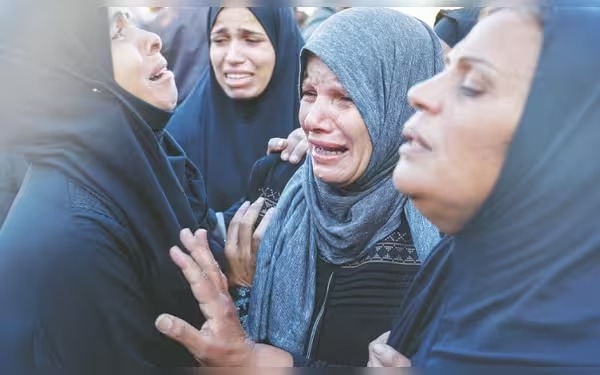Saturday, November 16, 2024 05:51 PM
Israeli Aid Delivery Under Scrutiny Amid Gaza Crisis
- Aid groups criticize Israel's insufficient aid delivery to Gaza.
- UNRWA describes northern Gaza's situation as catastrophic.
- Urgent need for consistent humanitarian access emphasized.
 Image Credits: dawn.com
Image Credits: dawn.comAid groups criticize Israel for inadequate aid delivery to Gaza amid a worsening humanitarian crisis.
The ongoing humanitarian crisis in Gaza has drawn international attention, particularly regarding the delivery of aid to those in desperate need. As the conflict continues, the situation has escalated, leading to severe shortages of food, water, and medical supplies. Aid organizations have been working tirelessly to provide relief, but their efforts have often been hampered by restrictions and delays in access to the region.
Recently, the Israeli military announced that it had opened the Kissufim crossing, stating this move was part of their "effort and commitment to increase the volume and routes of aid" to Gaza. This announcement came just a day before a critical deadline, raising hopes that more assistance would reach the beleaguered population. However, the reality on the ground tells a different story.
The United Nations Relief and Works Agency for Palestine Refugees in the Near East (UNRWA), along with eight other humanitarian groups, has expressed strong concerns regarding the adequacy of Israel's actions. They argue that despite the opening of the crossing, the amount of aid being allowed into Gaza remains insufficient. The situation in the northern part of the territory has been described as "catastrophic," with many families facing dire circumstances.
Humanitarian organizations have emphasized that the need for aid is urgent and that the current measures are not meeting the demands of the population. They have called for a more substantial and consistent flow of supplies to alleviate the suffering of those affected by the ongoing conflict. The criticism directed at Israel highlights a growing frustration among aid groups who feel that the promises made are not being fulfilled.
As the world watches, the plight of the people in Gaza continues to be a pressing issue. The international community must remain vigilant and advocate for the rights of those in need. It is crucial for all parties involved to prioritize humanitarian access and ensure that aid reaches those who require it most. The situation in Gaza serves as a stark reminder of the human cost of conflict and the importance of compassion in times of crisis.













